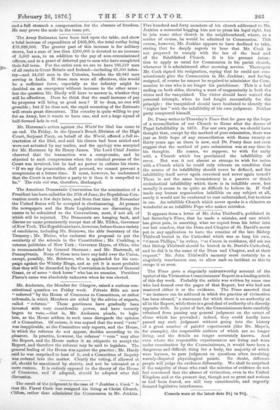Mr. Anderson, the Member for Glasgow, raised a curious con-
stitutional question on Friday week. Private Bills are now ' referred " by the House of Commons to Committees, or rather tribunals, in which Members are aided by the advice of experts, called " referees." These gentlemen have gradually been invested with very considerable power, and have recently begun to vote,—that is, Mr. Anderson pleads, to legis- late, as the House seldom in such cases disregards the opinion of a Committee. Of course, it was argued that the word "vote" was inapplicable, as the Committee only reports, and the House, in which the referees do not appear, decides according to its pleasure. In practice, however, the referees' " vote" may alter the Report, and the House makes it an etiquette to accept the Report, and therefore the referees may be said to legislate. The general feeling of the House was against the practice ; Mr. Hardy said he was surprised to hear of it, and'a Committee of Inquiry was ordered into the matter. Clearly the voting, if allowed at all, should be sanctioned by statute, and not be tolerated as a mere custom. It is entirely opposed to the theory of the House of Commons, and if adopted, should be adopted after full discussion.


































 Previous page
Previous page